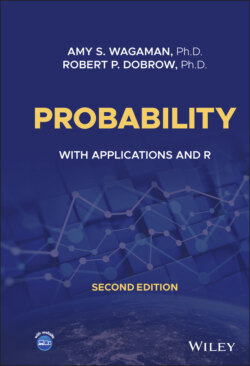Читать книгу Probability - Robert P. Dobrow - Страница 24
1.5 EQUALLY LIKELY OUTCOMES
ОглавлениеThe simplest probability model for a finite sample space is that all outcomes are equally likely. If has elements, then the probability of each outcome is , as probabilities sum to 1. That is, , for all
Computing probabilities for equally likely outcomes takes a fairly simple form. Suppose is an event with elements, with . As is the sum of the probabilities of all the outcomes contained in ,
In other words, probability with equally likely outcomes reduces to counting elements in and .
Example 1.9 A palindrome is a word that reads the same forward or backward. Examples include mom, civic, and rotator. Pick a three-letter “word” at random choosing from D, O, or G for each letter. What is the probability that the resulting word is a palindrome? (Words in this context do not need to be real words in English, e.g., is a palindrome.)There are 27 possible words (three possibilities for each of the three letters). List and count the palindromes: DDD, OOO, GGG, DOD, DGD, ODO, OGO, GDG, and GOG. The probability of getting a palindrome is
Example 1.10 A bowl has red balls and blue balls. A ball is drawn randomly from the bowl. What is the probability of selecting a red ball?The sample space consists of balls. The event has elements. Therefore, .
A model for equally likely outcomes assumes a finite sample space. Interestingly, it is impossible to have a probability model of equally likely outcomes on an infinite sample space. To see why, suppose and for all , where is a nonzero constant. Then summing the probabilities gives
While equally likely outcomes are not possible in the infinite case, there are many ways to assign probabilities for an infinite sample space where outcomes are not equally likely. For instance, let with for . Then, using results for geometric series,
We introduce some basic counting principles in the next two sections because counting plays a fundamental role in probability when outcomes are equally likely.
